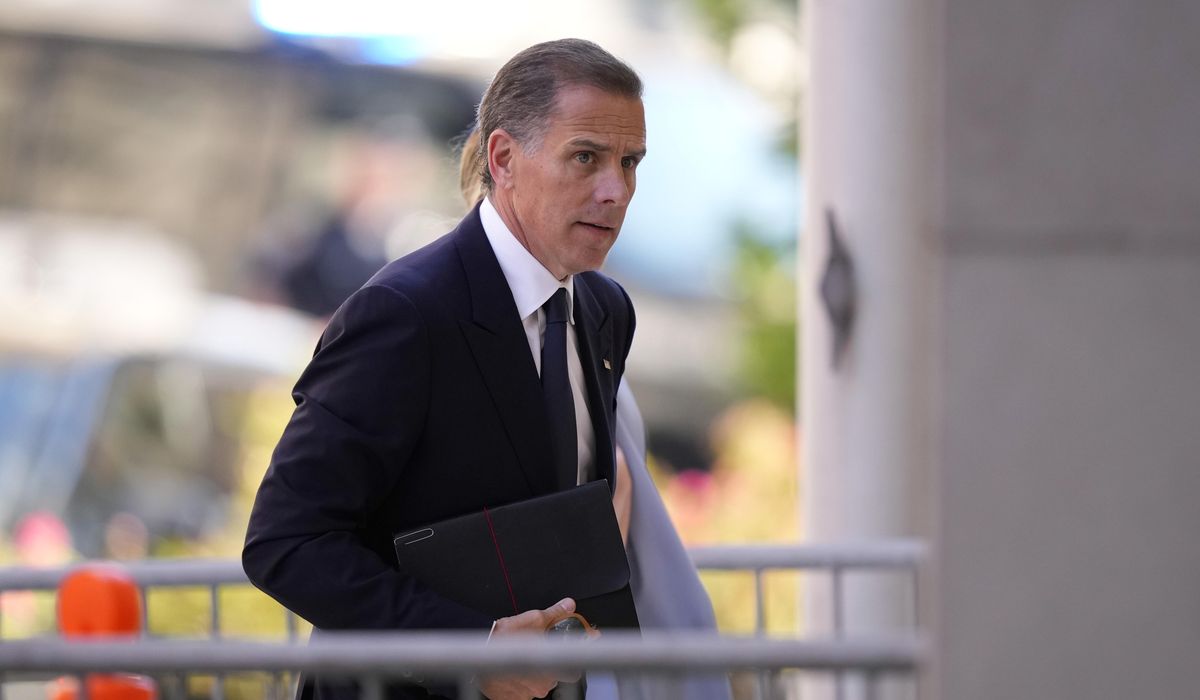


WILMINGTON, Delaware — Federal prosecutors told a jury that Hunter Biden “chose to lie” on a gun form while knowing he was an addict and drug user, as both sides made opening statements on the second day of the federal firearms trial of President Biden’s son.
“We would not be here today if he was just a drug addict,” prosecutor Derek Hines said. “It’s about the defendant’s lie and choices.”
Mr. Hines also urged jurors not to draw a distinction between Hunter Biden and any other addict as they weigh three criminal charges in the case.
“No one is above the law. It doesn’t matter who you are, or what your name is,” he said, adding that Hunter Biden “chose to illegally own a firearm.”
As he laid out his case, Mr. Hines said Hunter Biden bought the firearm from a gun seller in October 2018 who will testify that the first son filed out form 4473 by certifying that he was not a drug addict. He said the evidence will show that Hunter Biden “knew was a drug user and a drug addict” when he filled out the form.
Mr. Hines showed jurors text messages in which he acknowledged that he’s an addict and even played a clip of an audio recording of Hunter Biden’s memoir, in which he claimed to have the “superpower” of buying crack “anywhere, anytime.”
In his opening statement, defense attorney Abbe Lowell repeatedly emphasized the word “knowingly” on form 4473, accusing prosecutors of leaving the word out while trying to make their case.
He said prosecutors can’t prove that Hunter Biden considered himself an addict at the time of the gun purchase, saying that people with addictions tend to be in a “deep state of denial” about their drug use.
Mr. Lowell said family traumas, including the death of Hunter Biden’s mother and sister in a 1972 car crash that he and his brother Beau survived, and Beau’s death from cancer in 2015, led him to drugs and alcohol to deal with the grief.
Hunter Biden had periods of sobriety, Mr. Lowell said, claiming that the president’s oldest son did not consider himself to be an addict at the time of the gun purchase.
He also suggested that the gun dealer who sold the firearm to Hunter Biden skirted protocol to make the sale.
“A sale is a sale and that was their goal that day,” he said.
During jury selection on Monday, some prospective jurors were dismissed because they knew the Biden family personally, others because they held both positive and negative political views about the Bidens and couldn’t be impartial. Still, it took only a day to find the jury of six men and six women, plus four women serving as alternates, who will decide the case.
Much of the questioning focused on drug use, addiction and gun ownership, as attorneys sought to test prospective jurors’ knowledge of the case. They dismissed those with strong thoughts on drug use or who might want to tighten regulations on firearms.
The panel of 12 was chosen out of roughly 65 people. Their names were not made public.
Hunter Biden also faces a trial in California in September on charges of failing to pay $1.4 million in taxes. Both cases were to have been resolved through the deal with prosecutors last July, the culmination of a yearslong investigation into his business dealings.
But Judge Maryellen Noreika, a Trump appointee, questioned some unusual aspects of the deal, which included a proposed guilty plea to misdemeanor offenses to resolve the tax crimes and a diversion agreement on the gun charge, which meant as long as he stayed out of trouble for two years the case would be dismissed.
The lawyers could not come to a resolution on her questions, and the deal fell apart. Attorney General Merrick Garland then appointed the top investigator, a former U.S. attorney for Delaware, David Weiss, as a special counsel in August, and a month later Hunter Biden was indicted.
Opening statements come as Mr. Garland faces members of the Republican-led House Judiciary Committee in Washington, which has been investigating the president and his family and whose chairman has been at the forefront of a stalled impeachment inquiry stemming from Hunter Biden’s business dealings.
The Delaware trial isn’t about Hunter Biden’s foreign business affairs, though the proceedings are likely to dredge up dark, embarrassing and painful memories.
The president’s allies are worried about the toll the trial may take on the elder Biden, who’s long been concerned about his only living son and his sobriety and who must now watch as his son’s past mistakes are publicly scrutinized. And the president must do so while he’s campaigning under anemic poll numbers and preparing for an upcoming presidential debate with Mr. Trump, the presumptive GOP nominee.
Aboard Air Force One on Monday night, White House press secretary Karine Jean-Pierre was asked if the case might affect the president’s ability to do his job, and she replied, “Absolutely not.”
“He always puts the American people first and is capable of doing his job,” said Jean-Pierre, who declined to say if Biden got updates on the trial throughout the day or spoke to his son after the proceedings concluded.
The president was scheduled to travel to France on Tuesday evening and will be gone the rest of the week. The first lady is scheduled to join him later this week.
— This article is based in part on wire-service reports.
• Jeff Mordock can be reached at jmordock@washingtontimes.com.
